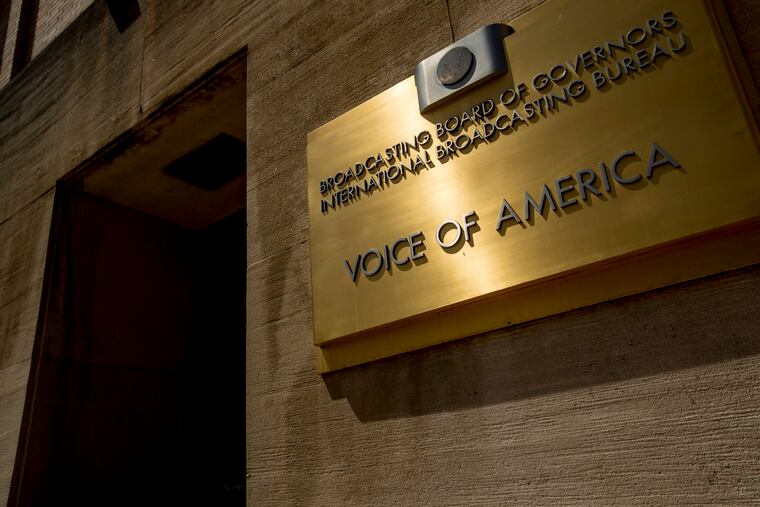Trump appointee sweeps aside the rule that ensured the ‘firewall’ at Voice of America
The declaration has raised fears among current and former officials that Michael Pack is seeking to reshape VOA and its sister agencies into promotional arms of President Trump.

WASHINGTON — The head of the agency that oversees Voice of America and other government-funded international broadcasters said he has rescinded a rule that blocked him from getting involved in news and editorial decisions, a step critics say would undermine their independence.
The declaration by Michael Pack, who heads the U.S. Agency for Global Media, has raised fears among current and former officials that Pack is seeking to reshape VOA and its sister agencies into promotional arms of President Trump, who appointed Pack.
They saw irony in the notion that the agencies — whose broadcasts are designed to counter foreign government's official censorship and propaganda — would themselves be subjected to oversight and potential censorship by a political appointee of the American government.
In an announcement posted late Monday night on USAGM's website, Pack said he had unilaterally rescinded a regulation that codifies the official "firewall" between political appointees like himself and the agencies' news operations. The rule, enacted last year by a board that Pack subsequently disbanded, spells out the specific legal protections as part of a broader firewall law passed by Congress in 1994.
"The rule prohibited the CEO from engaging in managerial and editorial oversight, which Congress mandated the CEO to conduct to ensure that the agency carries out its proper governmental mission," Pack wrote in a statement. He said his decision was based on "extensive legal analysis," which indicated that the rule interfered with Congress' directive that his agency "support the foreign policy of the United States."
Pack's agency supervises five networks that have reported and broadcast news and programs to audiences in repressive and authoritarian countries for decades. The agencies are funded by the federal government and carry some opinion material expressing government viewpoints but are otherwise independent and managed by staffs of experienced journalists.
The networks include VOA — the largest and oldest American-funded news agency — as well as the Office of Cuba Broadcasting, Radio Free Europe/Radio Liberty, Middle East Broadcasting Networks and Radio Free Asia.
» READ MORE: The White House could be turning independent Voice of America into Trump radio network | Trudy Rubin
The order rescinding the firewall rule may be Pack’s boldest move since he arrived at USAGM in June after a bruising two-year nomination fight. The Senate approved his stalled nomination after the White House launched an extraordinary attack on VOA, claiming that it was promoting Chinese and Iranian government propaganda.
Pack has moved swiftly to remake the broadcasting agencies, principally by dismissing their directors and advisory boards and installing new management.
He has declined to renew the expiring visas of foreign nationals who work at VOA, casting his inaction as part of a broader effort to root out foreign intelligence agents within the agencies, though he has yet to identify any spies.
Pack, a protege of former White House strategist Steve Bannon, has also publicly criticized VOA's reporting, calling it "substandard" but without citing any specifics.
He recently directed two members of his staff to investigate the work of VOA's White House correspondent, Steve Herman, for alleged anti-Trump bias; no disciplinary action has been taken against Herman.
Six former USAGM employees filed a whistleblower claim against Pack with the State Department's inspector general last month, alleging they were placed on administrative leave for raising concerns about his leadership. Among the allegations is that Pack breached the firewall by ordering the removal of a VOA journalist responsible for an Urdu-language video about Vice President Joe Biden.
In a statement Tuesday, Rep. Eliot Engel, D-N,Y., who chairs the House foreign-affairs committee, said Pack has “taken his rampage on America’s international broadcasting to another level . . . This may come as small comfort to journalists at USAGM broadcasters, as Mr. Pack has shown again and again that he doesn’t feel constrained by laws.”
Engel said he renewed his call for Pack to resign or be fired.
The attorney for the USAGM whistleblowers, Theodore Boutrous Jr., said Pack's actions are "sad and outrageous and plainly violate the Constitution." Pack, he said, "is trying to break the firewall down brick by brick. At the very least, Mr. Pack is now being honest with the public about what he has been doing along, taunting independent journalism and violating the First Amendment."
One of the whistleblowers, David Kligerman, USAGM's general counsel, said in a statement that "the firewall protects the editorial independence of Voice of America and its sister networks by insulating their editorial decisions from political interference. . . . As with any news organization, the absence of a robust firewall as a guarantee of editorial independence risks the credibility and ultimately the effectiveness of the entire enterprise."
USAGM's representatives didn't respond to a request for comment late Monday.
On its website, USAGM promotes the firewall as "an essential guarantee of the journalistic credibility of U.S. global media content. It says the firewall "prohibits interference by U.S. government officials, including the USAGM's Chief Executive Officer, in the objective, independent reporting of news" by the networks under its supervision "thereby safeguarding the ability of USAGM journalists to develop content that reflects the highest professional standards of journalism, free of political interference."
It adds that “the firewall is critical to ensure that USAGM journalists and editors can make the final decisions on what stories to cover, and how they are covered.”